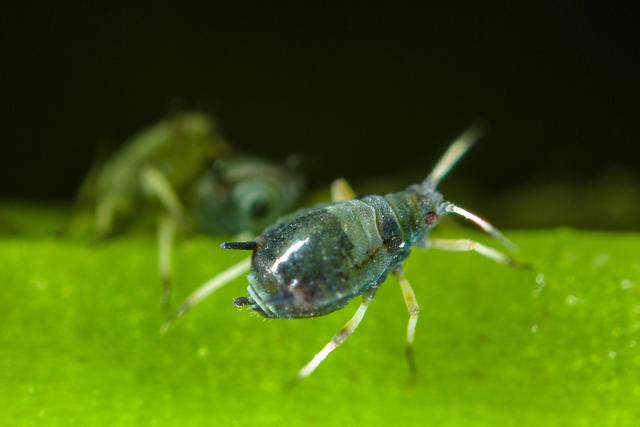UK research shows biological control success against cowpea aphids may depend on its bacteria
UK research shows biological control success against cowpea aphids may depend on its bacteria

The cowpea aphid attacks more than 200 plants and 50 crops worldwide but prefers legumes, particularly alfalfa. It is a major pest in the Tropics, but since the 1990s, cowpea aphid populations caused enough damage to alfalfa in the United States to warrant insecticidal sprays.
A naturally occurring wasp, Lysiphlebus testaceipes, helps keep aphid populations under control, but is not effective against the cowpea aphid in alfalfa. A University of Kentucky College of Agriculture researcher suspects that this natural biological control agent may have failed with the cowpea aphid because of the type of bacteria the aphid possesses.
Jen White, UK assistant professor of insect ecology, and her former graduate student Cristina Brady screened 46 cowpea aphid populations from around the world for Hamiltonella and five other bacterial symbionts as part of a grant from the U.S. Department of Agriculture National Institute of Food and Agriculture.
Bacterial symbionts, such as Hamiltonella, live inside of aphids and other insects. They are transferred directly from the mother to her offspring. In the cowpea aphid, it appears that Hamiltonella can help the aphids protect themselves from parasitoid wasps.
“We found all of the six bacteria we were looking for in some aphid populations,” White said. “It became interesting when the type of bacteria a particular aphid possessed depended upon the host plant from which the aphid was collected. Hamiltonella was pretty uncommon, but when we did find it, it was virtually always in aphid populations that came from alfalfa, from all over the world.”
Arsenophonus, another bacterial symbiont, was found in 87 percent of aphid populations collected from locust trees from all over the world. The locust tree is native to Kentucky but is invasive in other parts of the world. Hamiltonella was not found in the aphids the researcherscollected from locust trees.
With alfalfa and locust trees common in Kentucky, White and Brady conducted a second, localized study. Of the aphids collected from locust trees, 92 percent were infected with Arsenophonus, and 89 percent of the aphids coming from alfalfa contained Hamiltonella.
“Sometimes the locust aphids were collected from trees right next to alfalfa fields with their own aphids,” she said. “Even though they look like the same aphid, their biological properties are very different and their ecology-- how they’re going to interact with their other members of the community-- is going to be very different.”
She added that while these aphids can both eat some of the same plants, the ones feeding on locust trees didn’t do well on alfalfa, and the ones on alfalfa didn’t perform as well on locust.
White and Brady took their research a step further by using DNA analysis to study the success rate of the parasitoid wasp.
“We found more of the wasp’s DNA in the aphids coming from the locust trees than the ones coming from alfalfa,” she said. “We’ve seen some populations from locust trees that were essentially 100 percent parasitized, at least locally, but with populations coming from alfalfa, we didn’t see that level of parasitism at all.”
White will continue to study this aphid with the goal of determining what causes certain bacteria to appear in some aphids but not in others and the interaction between the symbionts and the host plants.
“This basic research will help scientists understand the basic biology of pest organisms, make the best biological control decisions possible and be aware of possible pitfalls certain biological control measures could have,” White said.
The findings of her Kentucky research project will appear in Ecological Entomology.
Entomology Research

